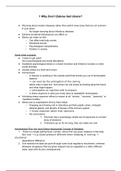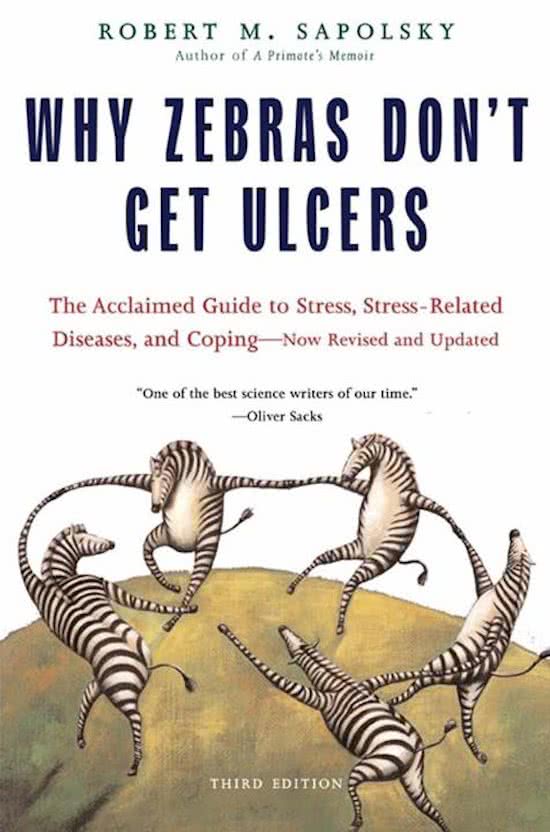1 Why Don’t Zebras Get Ulcers?
● Worrying about modern diseases rather than extinct ones (ones that are not common
in your area)
○ No longer worrying about infectious diseases
● Extreme emotional disturbances can affect us
● Stress can make us sick
○ Can affect real body events
○ Emotional turmoil
○ Psychological characteristics
○ Position in society
Some initial concepts
● 3 ways to get upset
3rd is psychological and social disruptions
● Sustained psychological stress is a recent invention and limited to humans or other
social primates
● Usually stress is a short term event
● Homeostasis
○ A stressor is anything in the outside world that knocks you out of homeostatic
balance
→ can even be the anticipation of the coming
Zebra when it sees lion, but human can just stress by thinking about far future
and what might happen
→ anticipation as cognitive skill to prepare
○ A stress-response is what your body does to reestablish homeostasis
● Activating stress response without a reason at all: “anxiety,” “neurosis,” “paranoia,” or
“needless hostility.”
● Stress due to expectations first by Hans Selye
○ Dropping and chasing rats in laboratory got them peptic ulcers, enlarged
adrenal glands, and atrophy of tissues of the immune system
○ → stress response rather than injections
○ His conclusions:
1. The body has a surprisingly similar set of responses to a broad
array of stressors
2. If stressors go on for too long, they can make you sick.
Homeostasis Plus: the more Stress-Appropriate Concept of Allostasis
1. There is a single optimal level, number, amount for any given measure in the body
Not true → e.g. blood pressure different when sleeping or running. →
situational
dependence difference
2. One reaches the ideal set point through some local regulatory mechanism, whereas
allostasis recognizes that any given setpoint can be regulated in a zillion different
ways, each with its own consequences,
, ● Homeostasis is about thinking with valve1 or that gizmo2
● Allostasis is about the brain coordinating body-wide changes, often including
changes in behavior
What your Body does to Adapt to an Acute Stressor
● Different stressors trigger same stress response
○ Rapid mobilisation of energy
○ Parasympathetic vs Sympathetic ANS (autonomic nervous system)
■ Glucose and proteins to muscles that are needed
■ Heart rate, blood pressure and breathing increases
■ Decrease in digestive processes
■ Decrease in growth and reproduction
■ Decrease in tissue repair
■ Immunity inhibited
■ Decreased pain perception
■ Shifts in cognitive and sensory skills (e.g. better memory, sharper
detection of sensations)
Walter Cannon
● Focused on an adaptive aspect of stress-response
● Fight or flight response
Selye
● Three-part view of stress
1. Initial (alarm) stage -stressor is noticed
2. Adaption or resistance stage -mobilisation of stress response system and
reattainment of allostatic balance
3. Exhaustion stage -prolonged stress → stress related diseases
-we r not running out of hormones or whatever we need for the response, but
the response itself is what is damaging (also since other functions of body are
neglected)
● Constant stress:
○ fatigue easily,
○ Diabetes
○ Cardiovascular disease
○ Peptic ulcers
○ In kids: stress dwarfism
○ Brain functioning: losing neurons and memory loss
○ And ofc all named things above for sympathetic response
○ Allostatic load: long history of massive stress hormone release ear
and tear throughout the body
Not being able to switch stress-response on:
● Addison disease
○ When facing major stressor, they fall into ‘Addisonian’ crisis: blood
pressure drops, cannot maintain circulation → shock
● Shy-Drager syndrome
○ Even getting up is a challenge already → severe drop in blood
1 Ventil
2 Ding/ Dingsbums
, pressure, involuntary twitching and rippling of muscles
Not being able to turn it off:
● At the end of an stressful event, stress-response can eventually become damaging
● Chronic stress potentially make you sick or can increase the risk of being sick
2 Glands, Gooseflesh and Hormones
Stress and the Autonomic nervous System
● Brain sends messages through the nerves that branch from your brain down your
spine and out to the periphery of your bod
● Voluntary nervous system: conscious movements
● Autonomic nervous system: system that projects to organs, (also muscles) and other
“involuntary” things like blushing and getting goosebumps
○ One half of this system is activated in response to stress, one half is
suppressed
1. Sympathetic nervous system: kicks into action during emergencies, or what you think
are emergencies
○ helps mediate vigilance, arousal, activation, mobilization
○ four F’s of behavior—flight, fight, fright, and sex
○ nerve endings of this system release adrenaline
○ also release the closely related substance
noradrenaline
○ Adrenaline secreted because of actions of the
sympathetic nerve endings in your adrenal glands
○ Noradrenaline secreted by all the other sympathetic nerve endings throughout
the body
2. Parasympathetic nervous system: mediates calm, vegetative activities
○ → everything but the four F’s
○ promotes growth, energy storage, and other optimistic processes
● the autonomic system works in opposition: sympathetic and parasympathetic
projections bring about opposite results in organs
Your Brain: The Real Master Gland
● mobilising waves of activity in response to a stressor via:
○ Neural route
○ Secretion of hormones
● sympathetic nerve endings in your heart secrete norepinephrine, which causes heart
muscle to work differently, norepinephrine is playing a neurotransmitter role
● If a neuron (or any cell) secretes a messenger that, instead, percolates into the
bloodstream and affects events far and wide, that messenger is a hormone
● rejuvenation therapy, organotherapy: grafting of testes for better sexual drive (20th
cent.)
○ → did not work → one big placebo effect
○ Lack of sex drive not due to less testosterone secreted by testes but rather
because ___ tells them to do so.
● Revolution hormone secretion:
○ First glands thought of to have their own mysterious way of functioning
, ○ Then pituitary thought of to be the master gland telling other glands what to
do
○ Lastly turns out that pituitary is given orders from brain
■ brain controls certain pituitary hormones by stimulating their release
and controls others by inhibiting them
● Guillemin and Schally pioneered a whole new corporate approach to doing science
○ → looking for other hormones secreted to have an effect on pituitary
○ → findings of those suggest brain as the master gland
→ base of the brain, the hypothalamus, contains a huge array of those releasing and
inhibiting hormones, which instruct the pituitary, which in turn regulates the secretions of the
peripheral glands
Hormones of the Stress-Response
● Next to adrenaline and noradrenaline, another set of
hormones are released during stress response:
● Glucocorticoids
○ Steroid hormones
○ Secreted by adrenal gland
● Secretion:
○ Hypothalamus secretes an array of releasing
hormones into the hypothalamic-pituitary (CRH)
○ CRH triggers the pituitary to release the
hormone ACTH
○ ACTH → adrenal gland releases
glucocorticoids
● During Stress: also secretion of glucagon by pancreas
● Glucagon, Glucos and SNS raise circulating glucose
○ → mobilising energy
● Pituitary secretes prolactin suppressing reproduction
during stress
● pituitary and the brain also secrete endorphins and
enkephalins → blunt pain perception
● pituitary also secretes vasopressin (antidiuretic
hormone) → role in the cardiovascular stress-
response
● various reproductive hormones such as estrogen, progesterone, and testosterone is
inhibited as well as growth hormones and insulin (storage of energy)
Hormone Gland Function
Glucocorticoids Adrenal Gland (later Chapters)
Glucagon Pancreas Mobilising energy
Prolactin Pituitary Suppresses reproduction
Endorphins and Enkephalins Brain and Pituitary Blunt Pain Perception






